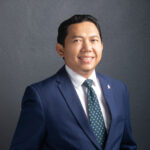
Standard Chartered Saadiq CEO Says Islamic Banks Must “Catch Up Fast” on Digitisation
by Johanan Devanesan January 17, 2024A swift digital transformation is unfolding across the world’s financial sectors, and Malaysia’s Islamic banking sphere is very much part of this change. Offering insight into this evolution is Mohd Suhaimi Abdul Hamid, CEO of Standard Chartered Saadiq Malaysia, who remarked to Fintech News Malaysia,
“We have seen the acceleration of digital adoption due to the pandemic, and banks are also paying more attention to digital transformation, as a result of rising demand for digital Islamic finance solutions. BNM’s issuance of five digital bank licenses in April 2022 has further spurred the banks to adopt even more digital services with the hope of being not only relevant, but also attractive, to consumers.”
This anticipatory move by BNM hints at a broader metamorphosis, encompassing not just banking but also insurance and takaful services. Malaysia’s first fully-digital Islamic bank, AEON Bank, has been approved to kick off operations, alongside fellow standalone digital banks GXBank and Boost Bank.
Noting these developments, Suhaimi stressed,
“Islamic banks must catch up fast on their digitisation efforts – it is a necessity to embrace the next-generation of technologies and transform the way they do business to attract tech-savvy clients. To expand the halal ecosystem, advanced technologies are essential to further facilitate cross-border trades and global supply chain.”
Positioning Standard Chartered Saadiq in the Digital Age
With its storied history and expansive market reach, Standard Chartered Saadiq aspires to lead in this digital shift.
“Standard Chartered Saadiq Malaysia has over 30 years history in Malaysia with global Shariah expertise covering 25 markets. Our aim is to lead the way in Islamic banking through world-class solutions that fulfil the financial needs of clients in Malaysia and leveraging the broader international Islamic banking network based in Asia, Africa and the Middle East,”
shared Suhaimi.
“We have prioritised the enhancement of digital client experience through a range of initiatives that has enabled us to effectively differentiate itself from its peers in an advanced and mature Islamic banking market such as Malaysia.”
As stated in the Malaysia Fintech Report 2023, Malaysia continues to be ranked 1st in the Global Islamic Economy Indicator (GIEI) Ranking, which identifies which economies are most ready for a halal product ecosystem.
Standard Chartered Saadiq’s endeavours have garnered acclaim. Referencing their accolade from Global Finance, Suhaimi stated,
“We have been recognised as the Best Islamic Digital Bank in Malaysia 2020 by Global Finance for four consecutive years since 2016 and most recently, we won The Digital Banker’s Best Islamic Bank for Digital CX in Malaysia at the Digital CX Awards 2023.”
Forging a Unique Space Amidst Rivals

Mohd Suhaimi Abdul Hamid
As Islamic banks grapple with the challenges of digital transformation, establishing a unique space is paramount. Suhaimi expanded on the bank’s approach, noting,
“What sets us apart is our vision in being a digital bank with a strong human touch and to be the go-to bank for SMEs and corporates. This means giving clients the choice to do everything digitally and still get assistance via phone, chat or video link. Our role is to be a connector bank in using technology to connect our corporate clients, markets and products to facilitate trade and investment.”
He continued,
“By providing both digital platforms and human interface, we bridge the divide between the traditional and the contemporary.”
Their digital metrics reflect the success of their strategy. Quoting their recent figures, Suhaimi said,
“As of July 2023, approximately 83% of our clients are using digital banking. We see a significant increase in mobile banking customers of 23% in 2023 vs 2022. Total digital transactions also increased 13%, as compared to 2022, as customers are getting more accustomed to banking digitally.”
Guiding Traditional Clients Towards Digital Horizons
Transitioning traditional retail clients to digital platforms has not been without its challenges. However, Suhaimi observed a changing mindset.
“We have seen a trend where traditional retail clients are increasingly receptive towards Islamic digital banking products and services because of better education and awareness, with a strong emphasis on benefits of the products rather than religion only, as shown in a 2017 paper, Factors Influencing the Adoption of Islamic Banking in Malaysia,”
he suggested, drawing reference to a 2017 research paper which shed light on the influential roles of customer satisfaction and consumer knowledge in the adoption of Islamic banking within Malaysia.
In response to these challenges, Suhaimi underscored their bespoke approach:
“Even in clients who are aware of Islamic banking products are not fully familiar with the breadth and scope of the evolving Islamic banking landscape that is still developing, both in terms of products and services as well as regulatory frameworks. To address this, we regularly train our relationship managers to be well versed in our products and services to be able to fully explain such intricacies to our clients. “
Harmonising Innovation with Shariah Principles
Marrying innovation with stringent Shariah guidelines presents its own set of complexities. Speaking on this, Suhaimi cited their meticulous approach, commenting,
“When it comes to adhering to Shariah principles, we must ensure that Saadiq products comply with the principles of Shariah, we have an independent committee comprising of distinguished academicians and independent consultants who are experts in Shariah. The committee meets regularly to discuss the development of new Islamic banking products and review the various procedures and practices related to the Islamic banking business.”
Pointing to Halal 360, the bank’s end-to-end Shariah-compliant financing, whether for in-country or cross-border financing needs, he added,
“Halal360 is one of our key pillars for growing our Islamic banking business. We support all client segments in Malaysia, especially the small and medium enterprises (SMEs) and we believe Halal360 will further strengthen our position in this space. We will continue to focus on our Halal360 program to support SMEs and corporate clients to export their products outside Malaysia through our Halal trade corridors (Pakistan, UAE, Bangladesh) to boost up the country’s FDI via initiatives with government agencies. “
Charting the Course for Data Security and Ethical Measures
In today’s climate, punctuated by data breaches, upholding stringent data security standards is imperative. Addressing these concerns, Suhaimi observed,
“As part of our commitment towards combating fraud in support of BNM [Bank Negara Malaysia] and industry efforts, Standard Chartered has also put in place several extra layers of safeguards to beef up our digital banking security and to combat online banking fraud more effectively. These include replacing SMS one-time passwords (OTPs) with the SC Mobile Key as the bank’s preferred transaction authorisation method, as well as the introduction of a kill switch.”
Envisioning the Future of Islamic Digital Banking
With a forward-looking perspective, Suhaimi’s vision for Standard Chartered Saadiq is crystalline.
“Digital innovation will be the enabler to provide clients with the best experience and banking journey, which will position Standard Chartered Saadiq as the bank of choice. We will continue to invest in digital to provide best-in-class products and services to our clients, including individuals, small and medium enterprises, as well as corporate, commercial and institutional banking clients,”
he opined.
Emphasising their collaborative approach, Suhaimi concluded,
“We believe that digital partnerships that leverage our partners’ strengths and capabilities are critical to scale our business in the future and will be the game changer for financial institutions moving forward.”
This article is a part of the Digital Islamic Banker series, produced by Fintech News Malaysia in collaboration with Backbase. Read how Syariah-compliant digital banking is carving out a niche in Australia.








